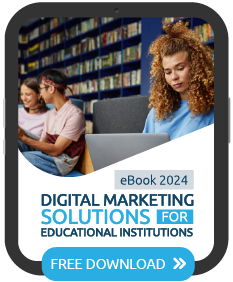Improving your student recruitment strategy is a big step in boosting your school’s enrollment numbers, making it an essential part of your marketing efforts. There are various approaches you can consider to get the job done, but knowing the right recruiting questions to ask prospective students can be a big help—setting your team off on the right foot.
You can proactively connect with prospects through your content and student recruitment team and address many of their concerns. This includes anything from refining your school’s program pages to supporting and guiding prospects through admissions. By addressing the right questions and topics through these efforts, you’ll be better positioned to generate a higher return on investment and get more out of your recruitment strategy.
Understanding the Different Stages of Student Recruitment
Many schools employ an admissions funnel model as part of their recruitment strategy. The funnel is naturally divided into three key stages. At the top of the funnel (TOFU), students are inquiring about the school and learning more about its offerings. In the middle or MOFU stage, prospects are becoming more serious about committing to the school—considering it a viable option for their education. At the bottom of the funnel (BOFU), they are ready to make the leap and enroll.
Throughout each stage, prospects may have specific questions and concerns that can prevent them from moving forward to the next step. By implementing TOFU to BOFU marketing and ensuring that your team understands your target student persona, you can begin providing answers that better connect you to your audience. Here, you’ll need to use your student persona, a semi-realistic representation of your ideal prospect, to hone in on specific needs and interests.
Example: This student persona, representing an international student, highlights a variety of key motivations and concerns. Each point listed in both categories can serve as a potential recruiter question to address—things that similar prospects may wonder about when looking over different school options:
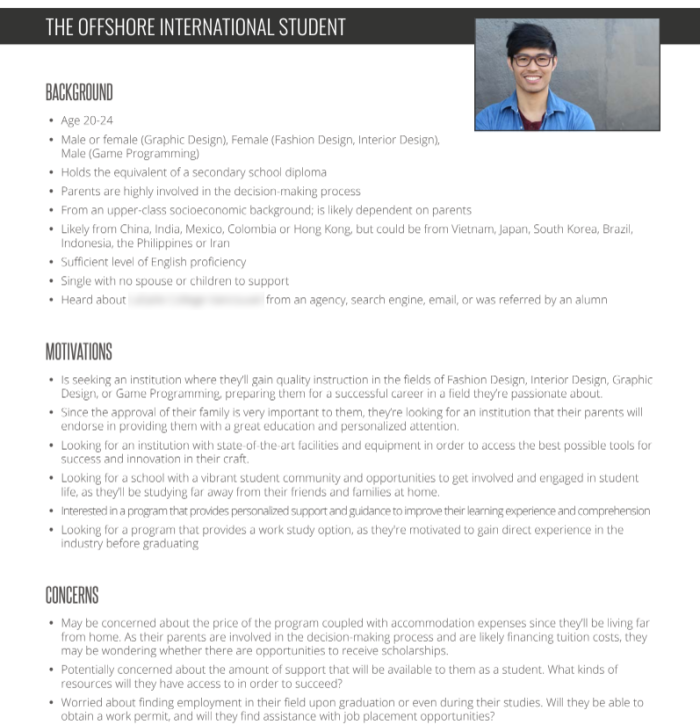
Your school can use these types of student persona documents to anticipate prospects’ questions and concerns and develop key messages to address them. Being proactive can reassure your prospects, showing them that your school prioritizes their needs.
Important Recruiting Questions to Consider with International Students
If you’re looking to boost your international student numbers, then it’s important to approach international student recruitment with careful research. You’ll need a strong understanding of the target market to create an accurate student persona. This is a great time to consider how you can best reach them—which platforms to focus on and whether or not you’ll face any language barriers.
As you seek to optimize your landing pages for international student recruitment, consider your school’s reputation in your target market. By knowing your school’s unique selling points and how you stand out against your competition in a new target market, you can highlight your school in the best way possible and answer some of the top recruiting questions that prospects may have along the way.
Answering Student Inquiries at the Top of the Funnel in Your School’s Content
At the TOFU stage, prospects are just discovering your school. The questions they may have at this stage will reflect their curiosity and interest in your school as they dive deeper into its offerings.
You can expect to be asked various questions, usually focussed on the school itself, its programs, and its services. This can include campus facilities, student life, academics, and financial aid programs. With the help of personalized web content, you can elevate your student recruitment strategy and preemptively address these questions.
Questions About Academics and Faculty
Before committing to a school, prospects will likely want to know whether or not the school offers programs in their field of interest. One of the strongest student recruitment strategies is showcasing your school’s unique selling points and highlighting the value of your programs and faculty.
For starters, prospects will want to know if your school has the program they want. If they’re undecided about their field of study, they may want to know what programs your school is known best for and how your teaching approach differs from other schools. They may also be interested in learning about the student-to-teacher ratio and how accessible professors are. Will they receive sufficient support from the faculty?
Additional recruiting questions prospects may want to ask your admissions team include the following:
- What are the professors like, and what is their teaching style?
- Are there any academic services in place to provide support if needed? Could they use specific campus facilities to further their education?
- Will there be any research opportunities associated with their specific field of interest? Will they gain hands-on learning experiences?
- How successful are graduates, and what role does the school play in their success?
- Are there any study abroad programs?
You can answer these questions through fun social media posts that reveal the academic side of your school or through in-depth info sessions and FAQ pages.
Carleton University takes a different approach by running an online event introducing prospects to Academic Life on campus. In a video, an International Admissions and Recruitment Officer, along with a Global Peer Advisor, go over the university’s academic resources, learning support opportunities, and even non-academic activities:

Addressing academic pathways to success through videos and events can appeal to certain prospects and relieve some of their concerns. It can also allow you to generate more engagement and push prospects further along the admissions funnel.
Many prospects may also wonder about sustaining a healthy study/life balance. These prospects may want to know more about the academic workload and schedule. A video or blog post highlighting a typical day in the life of a student at your school, particularly one taking a specific program, can effectively address these concerns.
Example: The University of Brighton shares a short video showcasing a day in the life of a media student. Prospects interested in studying media at the school can watch the video and easily imagine their day-to-day schedule after enrolling there.

Creating personalized content that aims explicitly to cover common questions prospects may want to ask recruiters allows your school to connect more meaningfully with its target audience. It can help you bridge gaps and secure your prospects’ loyalty more quickly. Students can address their academic interests and concerns about studying at a new school or environment. They can also talk about their background and goals.
Are you interested in increasing international student enrollments at your school? Get in touch with our team for tailored international student recruitment support!
Questions About the College and Student Life Experience
Prospective students planning to start university or college are likely curious about the campus environment and student life experience. As a result, they’ll probably want to learn more about the school’s atmosphere and offerings before committing to it even further. You can address these interests and concerns through your inbound marketing content, such as school blog posts or social media posts—making that content one of your college recruitment strategies.
Common questions about your school campus and student life can include:
- What facilities are available for students on campus?
- How different is your school’s student life or college culture from other schools?
- What do students like most about your school?
- What are some famous clubs or extracurricular activities? Are there any sports teams that students can join or support?
- Is the school involved in hosting any events?
- What are the housing options and procedures like? What kind of amenities and meal plans are included?
- What is the campus neighborhood like? Is security provided? Is the campus easily accessible via public transport?
A campus tour led by a student ambassador can be an effective way to cover some of these questions, especially since it allows you to transparently showcase your school through the perspective of an actual student. This is the approach that AECC University College takes in its video:

Another solution is having a webpage dedicated to your school’s vibrant community. John Cabot University does precisely this to highlight all of its clubs and activities. Prospects on this page can easily explore and learn about different programs—including ones for entrepreneurship, community service, and the arts. The school also introduces its poetry festival and university press on that page, boasting a lively student life atmosphere:
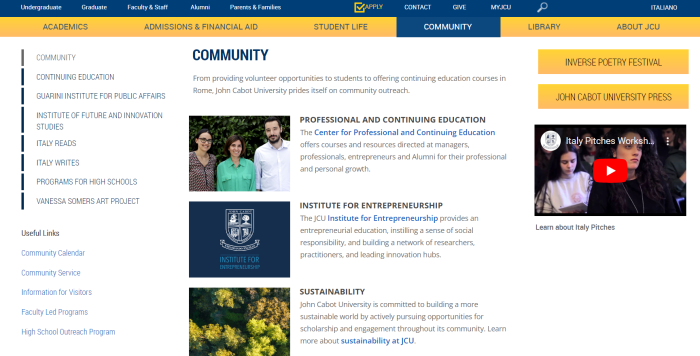
Source: John Cabot University
Financial aid is a big concern for many students. For this reason, recruiting questions may involve whether or not your school offers scholarships, awards, or bursaries. Prospects may be interested in potential work-study opportunities, asking about the likelihood of gaining work experience or financial aid when applying.
The University of Victoria breaks down tuition information for prospects while also providing information on relevant budgeting options, fee reduction appeals, forms, and payment deadlines:
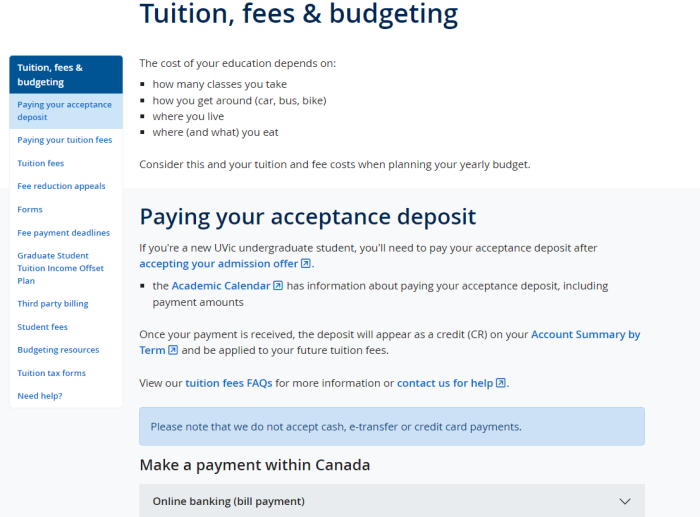
Source: University of Victoria
A well-organized page with all this important information can help prospects quickly determine whether or not your school is a good option for them. Being transparent about these topics and making it easy for prospects to navigate this information is a big step in nurturing loyalty with your audience.
Pro Tip: When recruiting international students, your team must factor in the potential apprehensiveness about relocating to a new city and cultural environment. Questions recruits ask can involve students’ readiness to study abroad and their interest in exploring a new environment.
Similarly, students may want to learn more about their potential new home before committing to an answer. This is where a dedicated web page about new city life for international students can be handy. The University of Copenhagen caters to its international students by embracing this approach and creating a web page that comprehensively addresses any concerns about living in Copenhagen as a non-national. The page includes video content from other international students as well as fun facts and interesting tidbits about Copenhagen:

Source: University of Copenhagen
Addressing Student Concerns Around Your School’s Applications through Recruiting Questions
It should be noted that your school can still enhance student recruitment even when prospects are in the middle of completing an application. The student portal is a great space to connect with your options and provide them with all the information they need to complete their application.
Using HEM’s proprietary student portal, schools can use the Virtual Admissions Assistant feature and provide extra information to help support prospects. Below is a screenshot of this feature in action, allowing opportunities at the University of the Commonwealth Caribbean to learn more about the Business Administration program without leaving the student portal:
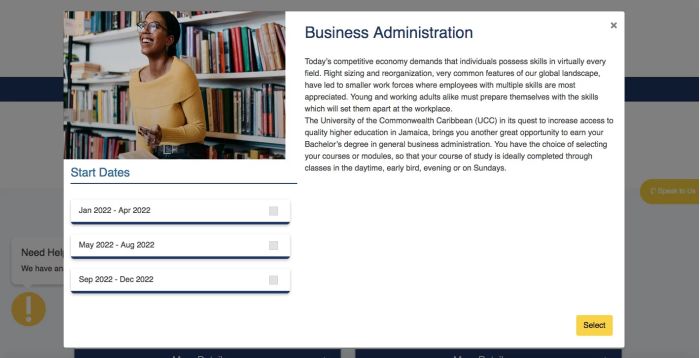
Schools can also provide information about the admissions process on its web page. This can be significantly helpful to students with specific questions about applying to your school. These questions can be about specific requirements and other key logistics, such as:
- Whether or not exam or college credit courses will be accepted
- If specific test scores (i.e. SAT/ACT) are required and what the minimum score would be if they are
- How important are recommendation letters in a student application
- How long the admissions process may take, and when can they expect to hear back
- Whether or not they need to declare a major when applying
- What kind of documents do they need to prepare
Your school can address these recruiting questions through an admissions-specific FAQ page. New York University does this well in its “How to Apply” webpage. Here, prospects can quickly scan key information, along with what to know before applying, and watch a short video about the applications process to settle any concerns:
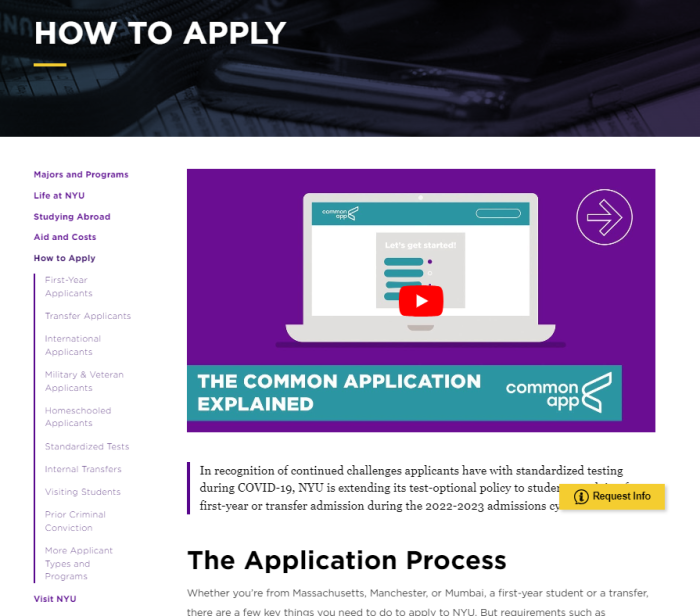
Source: New York University
You can also provide quick admissions tips via email newsletter or allow prospects to chat with current students to learn more about this potentially daunting process. Seneca College makes it easy for candidates to explore their study options and get quick answers to common questions via a handy chatbot on its website:
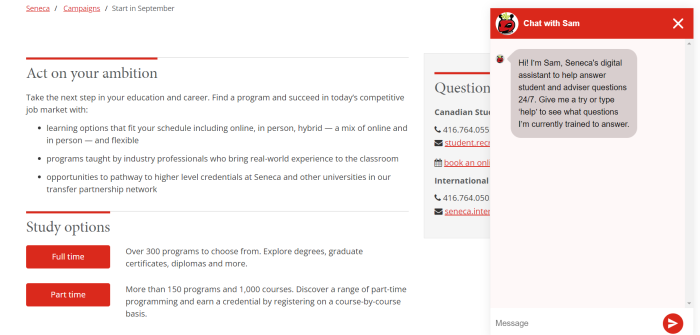
Source: Seneca College
Guiding Prospects Towards Enrolment by Addressing Final Concerns
Prospects want to know whether or not a school is the right fit for them. As they approach the end of the admissions funnel, they may be going over all their options and trying to determine their final choice.
There are questions recruiters ask or recruiter questions that are addressed throughout this process. Recruiters ask students about themselves and their interests to determine if they fit a school. Schools can address these questions in their content and better connect with their prospects. To secure enrolments and convert these prospects into students, your team must proactively assess what they may want to know at this stage.
Common issues that may make or break a student’s decision to enroll include student support services and career support. For instance, prospects may be wondering:
- Will academic advisors or tutors be available if needed?
- Are there special needs services available?
- Does the school provide counseling services or healthcare facilities on campus?
- Are there internship programs available? Will there be employment opportunities after graduation?
- How strong is the alumni network? What kind of support can alumni expect to receive?
To make this information more accessible, York University created a “Study at York” page that clearly outlines the different services and facilities available on campus. This includes everything from academic and financial services to health and well-being and career planning:
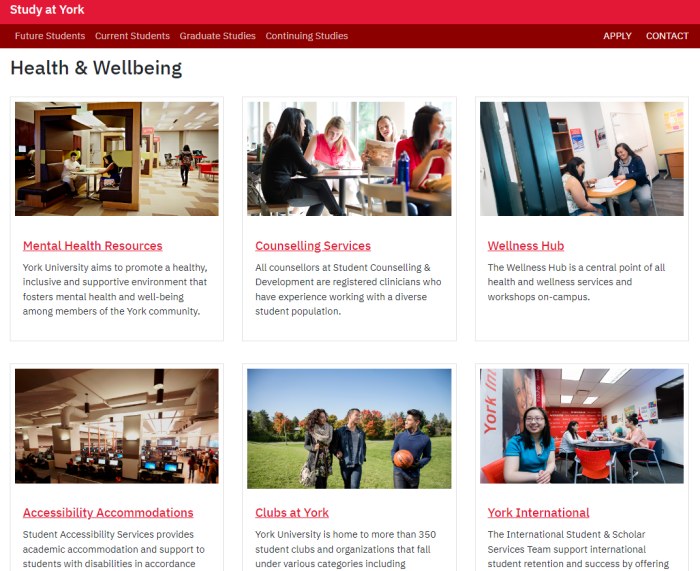

Source: York University
Providing answers to these types of questions in your school’s content and making that content easy to find is an effective way of improving your recruitment strategies for colleges. It also lets you maintain transparency, connect with your prospects, and keep them informed throughout the enrollment journey.



